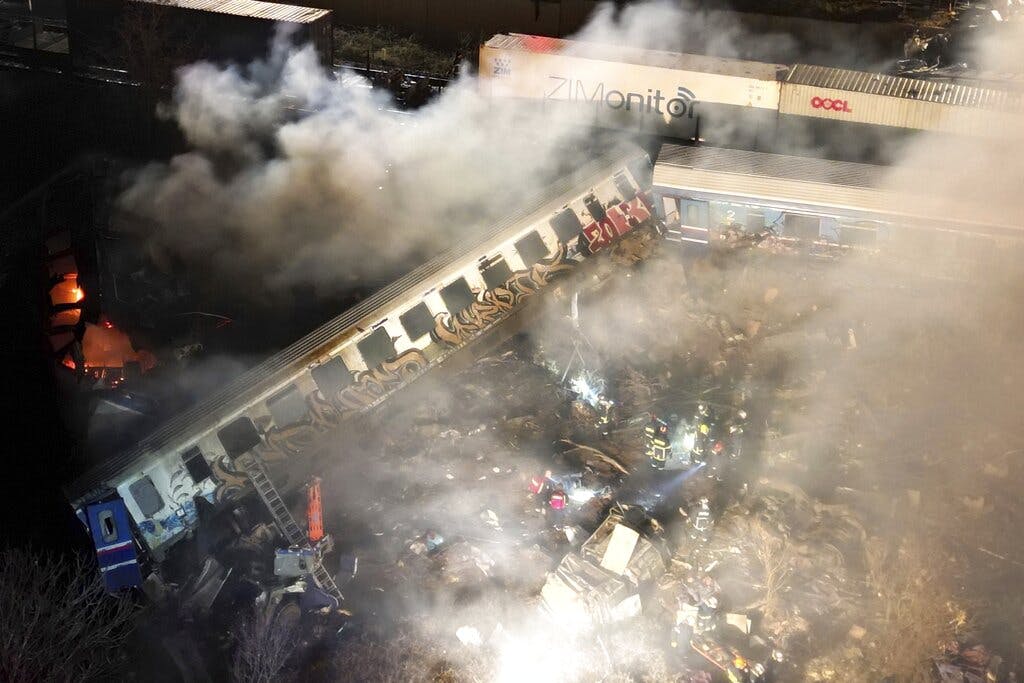Rail Disaster Shocks Greece, Plunging Country Into National Mourning Ahead of Election
All eyes will be on the government’s response ahead of the elections.

At least 36 people, many of whom were students, were killed late Tuesday in the worst train disaster in Greece’s history. It plunged the Mediterranean country into three days of official mourning just weeks ahead of national elections.
A packed passenger train and a freight train collided head-on about midway between Athens and Thessaloniki near the city of Larissa, causing multiple rail cars to derail at high speed, with at least three bursting into flames. Startling images of twisted, smoking wreckage strewn across the tracks and adjacent fields coupled with harrowing survivor accounts have underlined the scale of the destruction.
Whispers that it could have been avoided are already growing louder.
“This is an indescribable tragedy,” a government spokesman, Giannis Oikonomou, told reporters, adding that 500 workers from emergency services were at the scene of the crash. The Thessaly regional governor, Costas Agorastos, told Skai television that “carriage one and two” of the passenger train “no longer exist.”
According to initial reports from the AP, survivors said the impact threw several passengers through the windows of train cars and others fought to free themselves after the passenger train buckled, slamming into a field near a gorge about 235 miles north of Athens. Greek media reported that rescue workers had identified human limbs near the site of impact. In addition to the dead, at least 85 people were reported injured and at least 66 hospitalized, some in intensive care.
It is understood that many of the approximately 350 aboard the Greek passenger train, which is operated by Italy’s FS Group, were students returning to Thessaloniki after celebrating Carnival, likely at Patras in southern Greece. It was the first time the three days of festivities before Lent were feted since the Covid-19 pandemic in 2020.
“This is a terrible tragedy that is hard to comprehend,” the deputy health minister, Mina Gaga, said, adding, “I feel so sorry for the parents of these kids.”
What triggered the collision, which appeared to have occurred with a force more powerful than a bomb, was not immediately clear, but by daybreak clues started to emerge. The Greek newspaper Protothema reported that the Larissa station master directed the passenger train to the downward traffic line, resulting in it being on the same line as the freight train.
The paper noted that along its entire length, the railway line that connects Athens with Thessaloniki is double — the implication being that there is no excuse for two trains moving in opposite directions to be on the same line.
That station master was almost immediately placed under arrest, and allegedly told Larissa police that he gave an order to change the track but that it was not implemented by the system. Sources said that had the master realized that the passenger train was moving on the same line as the freight train, he would have ordered both to stop before they collided.
Troublingly, more reports are emerging of possibly systemic technical deficiencies that should have been addressed before this tragedy. Ta Nea reported that the president of the train drivers group OSE, Kostas Genidounias, said, “Nothing works, everything is done manually, with a human factor. We are in manual [mode] throughout the Athens-Thessaloniki network.” He added that train traffic lights and indicators “have not been working for a long time, we have made requests,” emphasizing that train drivers are supposed to take orders from the station master.
“The systems were there [but] now they don’t work and the responsibilities should be sought by the authorities, we constantly protest,” Mr. Genidounias said.
All Greek media were reporting that the top priority in the aftermath of the disaster is the search and rescue effort, which is herculean. Yet as the nation reels and as flags from atop the Acropolis to just about everywhere else fall to half mast, the blame game has started, and the stakes are very high. Judicial investigations are under way and the Larissa prosecutor’s office has already raised the prospect that felony crimes may have been committed, with penalties of 10 years to life in prison for the convicted.
There is also a political dimension. Greece has not known a tragedy of this scale since the Attica wildfires of 2018, in which 104 people perished not far from the capital. The government at the time, led by the current opposition leader, Alexis Tsipras, was widely perceived as responding too slowly to the disaster, and was criticized as falling short on holding relevant municipal and emergency authorities accountable.
The center-right government of the current prime minister, Kyriakos Mitsotakis, capitalized on those perceived failings and also is widely credited with capably steering Greece through the pandemic. Yet his administration has been roiled by a wiretapping scandal, and a state of cold war exists between his New Democracy party and Mr. Tsipras’s radical-left Syriza party.
Mr. Tsipras said that “what happened” Tuesday night “is unthinkable. Our thoughts [are with] the people who died so unjustly. Condolences to the families of the victims and support to those injured.”
Right now Syriza is trailing New Democracy in the polls, but with Greeks getting set to vote in national elections April 9, nothing can be taken for granted. It was Mr. Mitsotakis, always a deft reader of the national mood, who sensibly declared the period of national mourning, and he was expected to make a visit to the disaster area and Larissa on Wednesday. All Greek hearts are now with the victims of a painful tragedy in the countryside, but very soon indeed all eyes will be on Athens.

